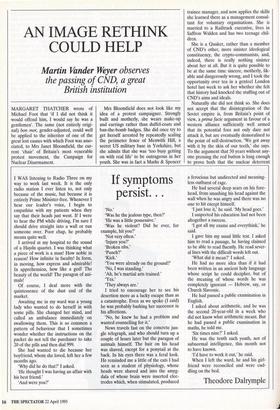If symptoms
persist.. .
I WAS listening to Radio Three on my way to work last week. It is the only radio station I ever listen to, not only because of the music, but because it is entirely Prime Minister-free. Whenever I hear our leader's voice, I begin to empathise with my patients when they say that their heads just went. If I were to hear the PM while driving, I'm sure I should drive straight into a wall or run someone over. Poor chap, he probably means quite well.
I arrived at my hospital to the sound of a Haydn quartet. I was thinking what a piece of work is a man! How noble in reason! How infinite in faculty! In form, in moving, how express and admirable! In apprehension, how like a god! The beauty of the world! The paragon of ani- mals!
Of course, I deal more with the quintessence of the dust end of the market.
Awaiting me in my ward was a young lady who wanted to do herself in with some pills. She changed her mind, and called an ambulance immediately on swallowing them. This is so common a pattern of behaviour that I sometimes wonder whether the instructions on the packet do not tell the purchaser to take 20 of the pills and then dial 999.
She had wanted to die because her boyfriend, whom she loved, left her a few months ago.
`Why did he do that?' I asked.
'He thought I was having an affair with his best friend.'
`And were you?' `No.'
`Was he the jealous type, then?'
'He was a little possessive.'
`Was he violent? Did he ever, for example, hit you?'
`Not very often.'
`Injure you?'
`Broken ribs.'
`Punch?'
`Kick.'
`You were already on the ground?' `No, I was standing.'
`Ah, he's martial arts trained.'
`Yes.'
'They always are.'
I tried to encourage her to see his desertion more as a lucky escape than as a catastrophe. Even as we spoke (I said) he was probably bashing her successor in his affections.
`No, he knew he had a problem and wanted counselling for it.'
News travels fast on the concrete jun- gle telegraph, and who should turn up a couple of hours later but the paragon of animals himself. The hair on his head was shaved, except for a ponytail at the back. In his eyes there was a feral look. He reminded me a little of the cats I had seen as a student of physiology, whose heads were shaved and into the amyg- dala of whose brain were inserted elec- trodes which, when stimulated, produced a ferocious but undirected and meaning- less outburst of rage.
He had several deep scars on his fore- head, from smashing his head against the wall when he was angry and there was no one to hit except himself.
'I just lose it,' he said. 'My head goes.' I suspected his education had not been altogether a success.
`I got all my exams and everythink,' he said.
I gave him my usual little test. I asked him to read a passage, he having claimed to be able to read fluently. He read sever- al lines with the difficult words left out.
`What did it mean?' I asked.
He had no more idea than if it had been written in an ancient holy language whose script he could decipher, but of the meaning of whose words he was completely ignorant — Hebrew, say, or Church Slavonic.
He had passed a public examination in English.
I asked about arithmetic, and he was the second 20-year-old in a week who did not know what arithmetic meant. But he had passed a public examination in maths, he told me.
`Six times nine?' I asked.
He was the tenth such youth, not of subnormal intelligence, this month not to have known.
'I'd have to work it out,' he said.
When I left the ward, he and his girl- friend were reconciled and were cud- dling on the bed.
Theodore Dalrymple


























































 Previous page
Previous page